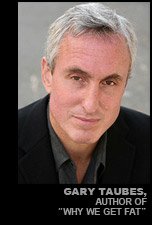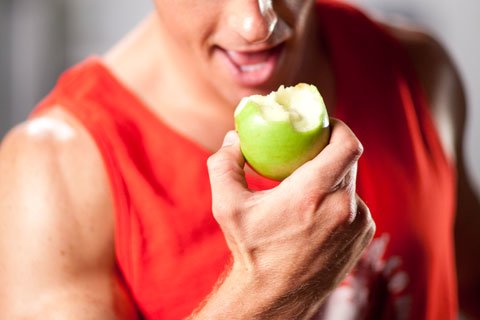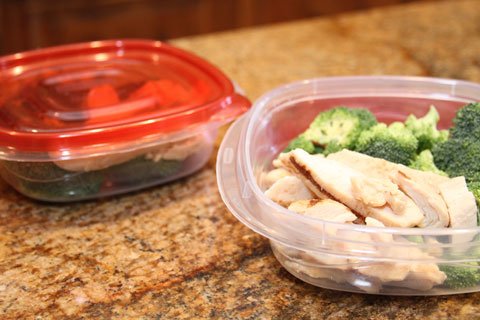Are Carbs Wrecking Your Body?

Surely you've heard of Gary Taubes by now. He's the well-known journalist who wouldn't settle for otherwise commonly held beliefs regarding diet and disease.
So he spent years digging through the scientific literature in search of answers. And, when he came to his own conclusions, Mr. Taubes had the audacity to question much of what we believed about diet in his article:
His most recent book is titled Why We Get Fat.
If you want to see Gary Taubes in action, check out these clips from the Dr. Oz show or, if you have a little more time, listen to his speeches on Youtube.
Taubes main message is one by which many bodybuilders already abide: "carbohydrates are inherently fattening, some more than others and, those of us predisposed to put on fat do so because of the carbohydrates in our diet." In support of his contention, here are a few key points Taubes brings us from Biochemistry 101:
One major difference separating Gary Taubes from promoters of a high-protein, low-to-very-low carbohydrate diet. The latter believe that everyone benefits from a low-carb diet, that "one diet fits all." Whereas Taubes recognizes what the biochemistry and endocrinology books say, that we all respond differently to carbs and insulin.
- Bodybuilders Watch Their Carbohydrate Intake and mainly choose from nutrient and fiber rich sources of carbohydrates including fruits, vegetables and reasonable portions of whole grains. Taubes also believes in eating carbs that are less refined and come packed with fiber while minimizing sugar intake.
- Bodybuilders Know That One Diet Doesn't Fit All. When it comes to your food intake, there is nothing more important than keeping an open mind (because science is always evolving), being aware of your own body and being willing to adapt and take an individualized approach to your nutrition intake to achieve your goals. It is vital to take into account medical history, current training program, dietary supplement and medicine intake, weight, body fat, goals and health issues.
As an example, a diet for someone who is gluten sensitive will look vastly different than a person who loves grains, hates cooking, has no issues with gluten and runs marathons. And, as Mr. Taubes states in his book Why We Get Fat that there is no "no one-size-fits-all prescription for the quantity of carbohydrates we can eat and still lose fat or remain lean."
- A Bodybuilder's Diet is Rich in Fruits and Vegetables. Now, the quantity of fruit consumed and type of vegetables eaten depends on many factors including where someone is in their training program, their individual goals, body weight, food likes and dislikes. However, a bodybuilder recognizes the importance of fruits and vegetables in the diet and that a diet rich in fruits and vegetables is tied to a decreased risk of cardiovascular disease and a potential decrease in some types of cancer.
This is where the bodybuilding diet and Mr. Taubes collide head on. Taubes believes there is a lack of clinical trials to support consuming produce. And, while some population-based studies do show a pretty small reduction in risk of disease with a higher intake of fruits and vegetables, other studies are more convincing.
At least add non-starchy vegetables to your diet and then consume sugar-rich fruit and starchy vegetables in moderation if you are trying a low carbohydrate diet for weight loss. But, cut your produce consumption as a last step - after cutting out all alcohol (#1 step for weight loss) and other carbohydrates.


 Click To Enlarge.
Click To Enlarge.
It's common knowledge that fruits and vegetables are
good for you. Mr. Taubes wonders how accurate that is.
- Educate yourself and don't accept what people say about diet or supplements without a good, scientific explanation.
- See an expert. Finding out how to change your diet to best suit your needs takes a wealth of knowledge and a lot of detective work.
Though people with a good body awareness can self-diagnose to an extent, going to a specialist (and by specialist I mean endocrinologist if you have issues with PCOS or insulin sensitivity or registered dietitian who specializes in whatever area of your diet you are trying to improve) will save you time and the agony of trying to figure out things for yourself. And, any good health professional will gladly refer you to someone if they aren't the expert you need.
- Adapt as necessary. In addition to dietary recommendations changing because of advances in science, our own dietary needs change frequently throughout life and therefore, it is vital that you are willing to adapt easily.
The most important truth about diet is that one approach does not fit all. Lifestyle (cooking, eating out, fast food only etc.), dietary needs, nutrition and physique goals, training program and many other factors should be taken into account. Gary Taubes has many valid points and he presents these in an engaging manner backed by his own take on the science. However, before jumping on the low carb bandwagon (because much of what Taubes talks about is related to carbohydrate consumption making us fat), be sure to take a close look at your past history and willingness to make dietary changes and stick with them for a long period of time. After all, if you want lasting results, you'll need to try a new approach for more than just a few days.
References:
- Gary Taubes website: http://www.garytaubes.com/2011/03/dose-of-intervention-land-of-dr-oz/
- Eur J Cancer. 2010 Sep;46(14):2563-80.
- Jpn J Clin Oncol. 2009 Jun;39(6):352-9.
- Breast Cancer Res Treat. 2009 Mar;114(1):13-22.
- J Natl Cancer Inst. 2007 Oct 3;99(19):1471-83.
- Am J Clin Nutr. 2006 May;83(5):1126-34.
- Arch Intern Med. 2009 Apr 13;169(7):659-69.
- Curr Pharm Des. 2009;15(10):1072-84.
- J Hum Hypertens. 2007 Sep;21(9):717-2
- www.nytimes.com
Recommended Articles
| Share This Article: |




